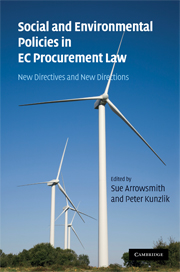Book contents
- Frontmatter
- Contents
- Contributors to the volume
- Preface
- Chronological table of cases
- Table of European legislation
- Table of UK legislation
- Editors' Note – the decision in Rüffert v. Land Niedersachsen
- 1 Public procurement and horizontal policies in EC law: general principles
- 2 EC regulation of public procurement
- 3 A taxonomy of horizontal policies in public procurement
- 4 Application of the EC Treaty and directives to horizontal policies: a critical review
- 5 The impact of the EC state aid rules on horizontal policies in public procurement
- 6 EC public procurement law and equality linkages: foundations for interpretation
- 7 Disability issues in public procurement
- 8 The legality of SME development policies under EC procurement law
- 9 The procurement of ‘green’ energy
- 10 Reconciling national autonomy and trade integration in the context of eco-labelling
- 11 CSR in the utilities sector and the implications of EC procurement policy: a framework for debate
- 12 Coordinating public procurement to support EU objectives – a first step? The case of exclusions for serious criminal offences
- Index
- References
12 - Coordinating public procurement to support EU objectives – a first step? The case of exclusions for serious criminal offences
Published online by Cambridge University Press: 06 September 2009
- Frontmatter
- Contents
- Contributors to the volume
- Preface
- Chronological table of cases
- Table of European legislation
- Table of UK legislation
- Editors' Note – the decision in Rüffert v. Land Niedersachsen
- 1 Public procurement and horizontal policies in EC law: general principles
- 2 EC regulation of public procurement
- 3 A taxonomy of horizontal policies in public procurement
- 4 Application of the EC Treaty and directives to horizontal policies: a critical review
- 5 The impact of the EC state aid rules on horizontal policies in public procurement
- 6 EC public procurement law and equality linkages: foundations for interpretation
- 7 Disability issues in public procurement
- 8 The legality of SME development policies under EC procurement law
- 9 The procurement of ‘green’ energy
- 10 Reconciling national autonomy and trade integration in the context of eco-labelling
- 11 CSR in the utilities sector and the implications of EC procurement policy: a framework for debate
- 12 Coordinating public procurement to support EU objectives – a first step? The case of exclusions for serious criminal offences
- Index
- References
Summary
Introduction
As chapter 1 explained, the main effect of the procurement directives on horizontal policies in public procurement is to restrict Member States' discretion to pursue their own policies because of the effect such policies have on trade. As discussed in earlier chapters, in particular in chapter 4, there is much debate over whether some of these restrictions can be justified, and some commentators argue that Member States should enjoy broader powers to pursue horizontal policies. This argument can be made both for policy areas of concern to the EU itself, and for areas of purely national concern.
In addition, as chapter 1 elaborated (in section 5.3), there have been calls for the EU not only to provide Member States with more freedom, but also itself to harness the power of public procurement in a proactive way to support the EU's own policies, and some steps have now been taken in this direction.
In this respect the 2004 procurement directives constituted a ‘first’ in including two sets of provisions that do this for the first time. One set of provisions is that requiring procuring entities to consider issues of accessibility for all users, including disabled persons, in designing specifications. This is considered further in chapter 7 on disability issues.
- Type
- Chapter
- Information
- Social and Environmental Policies in EC Procurement LawNew Directives and New Directions, pp. 479 - 498Publisher: Cambridge University PressPrint publication year: 2009
References
- 3
- Cited by

